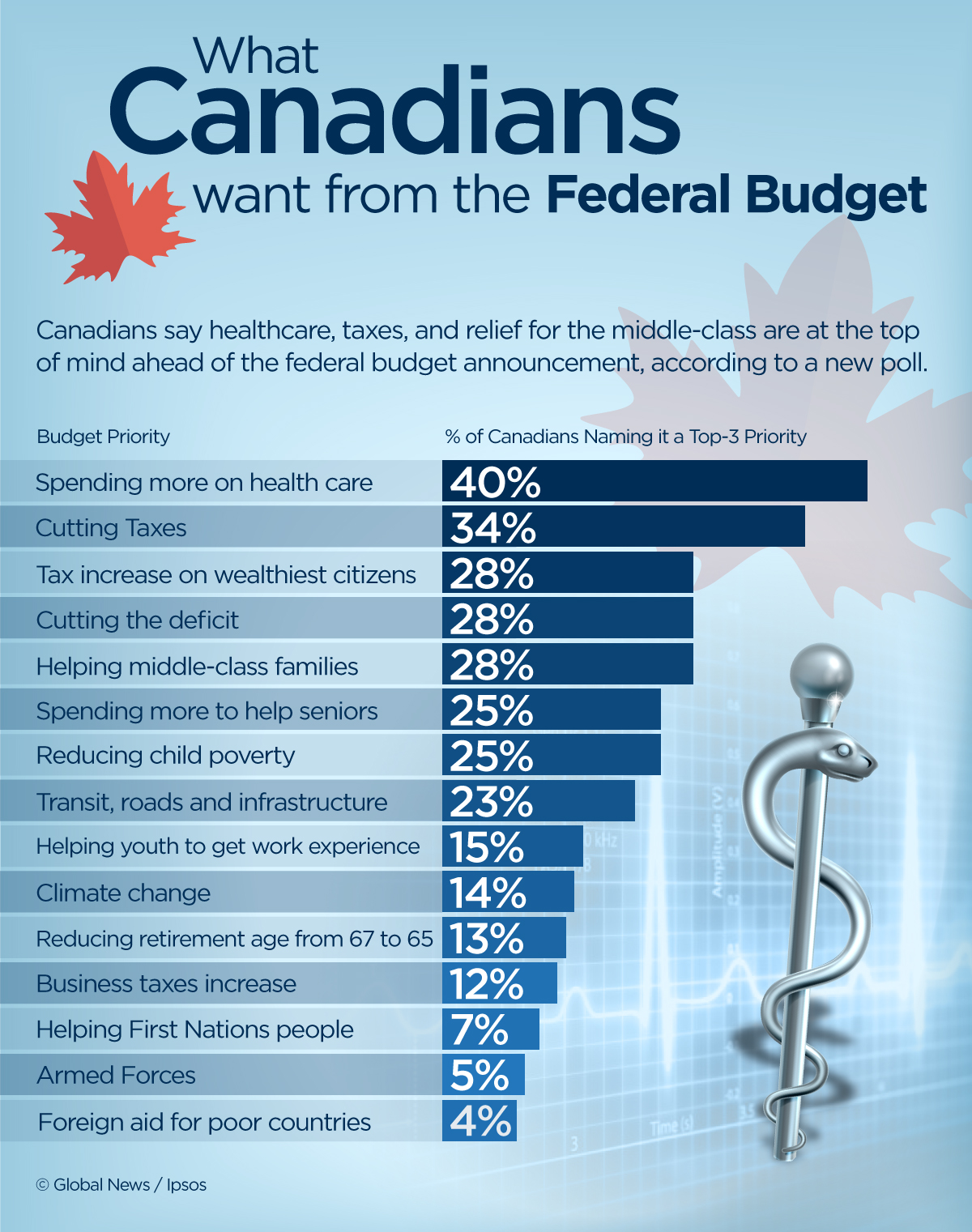Global News will have live updates of the federal budget announcement starting at 4 p.m. ET online and on-air featuring a special broadcast with host Dawna Friesen.

Justin Trudeau’s government is set to unveil its first budget Tuesday and the top priorities for Canadians are healthcare, taxes, and relief for the middle class, according to a new poll.
At a time when many across the country are worried about economic uncertainty, a new Ipsos poll conducted exclusively for Global News, found 40 per cent of Canadians names ‘spending more on health care’ as the top priority from a list of 15 possibilities.
Canadians were asked to rank 15 potential priorities from highest to lowest, with their top-three choices aggregated to produce the rankings below.
Thirty-four per cent of respondents said ‘cutting taxes’ was a top-three priority, while ‘increasing taxes on Canada’s wealthiest citizens’ was chosen 28 per cent of the time.
Spending more to help the middle class was also ranked highly, while social services spending on seniors and reducing child poverty also received strong support. The Liberals have already delivered on their campaign pledge to save middle income families money as of Jan. 1, and the government will likely remind Canadians of that move on Tuesday as the budget is announced.
WATCH: Looking ahead to the 2016 budget. Jacques Bourbeau reports.

A provincial breakdown of the new data showed healthcare was high across the country, with the most support in B.C. (56 per cent) followed by Atlantic Canada (44 per cent), and Alberta (41 per cent). Saskatchewan and Manitoba residents were the lowest with 32 per cent ranking healthcare spending in their top three. Quebec and Ontario residents were comparable on the issue at 39 per cent and 35 per cent.
“Health is one of those things that is seen as being a shared responsibility between the provincial and federal governments, and they do look for leadership from the federal government on it,” said Bricker.
During the 2015 election the Liberals promised to spend $60 billion over 10 years for infrastructure and Tuesday’s budget will likely contain a major announcement. Canadians ranked infrastructure spending, which the Liberals have said is intended to help stimulate the sluggish economy, as a top priority 23 per cent of the time, according to the poll.
WATCH: Raitt accuses Liberals of misleading Canadians on deficit spending
On the eve of the Liberal federal budget announcement, Conservative finance critic Lisa Raitt demanded to know just how much debt the government plans to take on in 2016.

Cutting the deficit was chosen 28 per cent of the time as a top three priority by those surveyed. A previous Ipsos poll found a majority of Canadians (73 per cent) don’t want the Liberals to break an election promise of keeping the deficit at $10 billion.
Finance Minister Bill Morneau has suggested the deficit could grow to $18 billion, while some experts say it could reach $30 billion.
READ MORE: ‘This is it’: the cancer treatment that has doctors talking about
- Trudeau tight-lipped on potential U.S. TikTok ban as key bill passes
- Hundreds mourn 16-year-old Halifax homicide victim: ‘The youth are feeling it’
- Canadians more likely to eat food past best-before date. What are the risks?
- On the ‘frontline’: Toronto-area residents hiring security firms to fight auto theft
Issues which the Liberal government have also promised action on like getting young people into the work place, funding to reduce greenhouse emissions and rolling back old age security eligibility from 67 to 65 years old were all ranked lower down the list by Canadians. Spending more on First Nations people, military spending, more money for foreign aid ranked as the bottom three priorities according to those surveyed.
Dr. Chris Simpson, chair of the Wait Time Alliance and a cardiologist at Kingston general hospital, says healthcare is always the “no. 1 or No. 2” issue in the country.
“It’s always surprised me how federal election campaigns and even provincial campaigns always seem to drive health out the discussion,” said Simpson. “One of the things we have been encouraged about is the federal government has talked about healthcare and the new federal health minister has been quite vocal that the federal government can have and should be playing a bigger role.
With the federal budget set to be unwrapped Tuesday by Minister Morneau, Simpson hopes to see more money for homecare- also a Liberal campaign promise– and some of the infrastructure money allotted to long-term care facilities to alleviate hospital congestion.
Danielle Martin, a family physician and vice-president at Women’s College Hospital in Toronto, said while the Liberals have committed to the negotiation of a new health accord between the federal government and the provinces, it’s unclear if this will mean more cash.
“What’s not yet clear is how much if any of that commitment would actually reflect a willingness to invest new money in the system,” she said. “Do the Trudeau Liberals have the intention of investing anything further in the health accord, or is the health accord going to be more an exercise of sitting down and talking to the provinces about shared commitments without any new money flowing.”
The information and/or data may only be rebroadcast or republished with full and proper credit and attribution to “Global News Ipsos.” These are some of the findings of an Ipsos poll conducted between March 14 and 16, 2016, on behalf of Global News. For this survey, a sample of 1,008 Canadians from Ipsos’ online panel was interviewed online. The precision of Ipsos online polls is measured using a credibility interval. In this case, the poll is accurate to within +/ – 3.5 percentage points, 19 times out of 20, had all Canadian adults been polled.





Comments